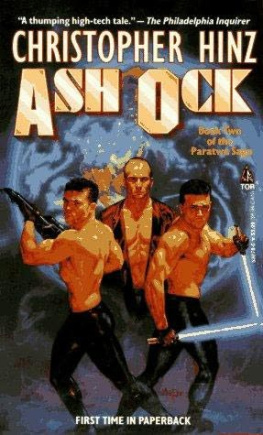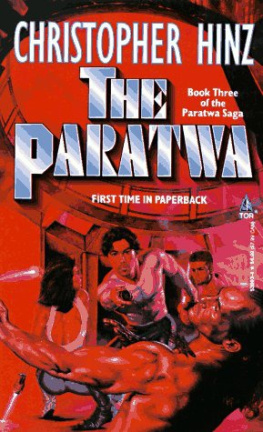Christopher Hinz
Paratwa - 02 - Ash Ock
Prologue
Ghandi stood with the captain on the flight deck, their hands gripping the sway bars, their bodies rocking back and forth. Outside the shuttle, the fierce Colorado winds screamed across the thick hull, blasting wads of snow against the narrow band of windows, buffeting the craft as if it were a freefall toy in the hands of a child. The pilot, strapped tightly in his acceleration chair in front of them, kept his eyes riveted to the instruments. Sight navigation was useless in such a storm.
Well? demanded the captain.
The pilot, maintaining his vigil on the control board that half encircled him, shook his head. Gone again, Captain. It's a weak signal
I don't care what kind of signal it is, growled the captain. I'm not spending the whole day flying through this crap. If you can't lock on in sixty seconds, get us the hell out of here.
A particularly violent updraft banked the craft thirty degrees. Ghandi lost his balance. He lunged sideways, mashed his face into the captain's shoulder, inhaled the stench of a freshly spirited odorant bag. The smell alone almost knocked him back in the opposite direction.
The captain glared. If you can't stand a bit of turbulence, Ghandi, then strap yourself in!
Ghandi exhaled slowly, turning away to hide his anger. This captain had a nasty temper, but corresponding displays from his crew were not tolerated. Even a mild grimace from Ghandi could gyrate the captain into a full-blown tantrum.
And the man had a smell that would frighten children.
Ghandi wore an odorant bag, too; most pirates kept a hybrid of foul scents looped around their belts-a symbol of their particular clan, a badge of the true Costeau. Still, Ghandi removed his odorant bag once in a while
It's back! yelled the pilot. And I've got a fix.
The captain grunted.
Six or seven miles to the southwest, said the pilot, right where Denver squeezes itself against the mountains.
One of our ships? asked the captain.
No.
E-Tech?
The pilot hesitated. I don't know. I've never seen a beacon like this before. A sporadically pulsed cardioid pattern. Extremely low power. I doubt whether anyone beyond a twenty-mile radius could even pick it up. I'm sure it's a distress signal, but whether or not it's E-Tech, I couldn't say.
What could you say? grilled the captain.
The pilot shrugged.
The captain's eyes drifted shut, a retreat into deep thoughts. Ghandi knew what those thoughts were.
If it's an E-Tech ship, it could be a trap. Sucker us down to the surface with a phony distress signal, then arrest us for illegal trespass. We're on a dirty flight-unlisted with E-Tech's orbital control-and we're in restricted airspace to boot. Lately, the bastards were getting tougher-penalties for such intrusions were becoming harsher. Whatever moral qualms E-Tech had once boasted regarding entrapment had vanished years ago. Pirate captains, caught on the surface without permission, were being levied heavy fines. Some Costeaus had even been stripped of their vessels.
Good reasons for not responding to distress calls.
But maybe this ship isn't E-Tech. Maybe it's colony-bred treasure hunters, just as dirty down here as we are. Maybe they had engine failure and can't lift off.
An E-Tech outpost existed in Texas, seven hundred miles to the southeast. But if the captain of this shuttle was on a dirty flight, probably he would not risk contacting that base, at least not until things got desperate. A short-range, low-powered distress beacon offered a fair shot of reaching one of the numerous Costeau flights that constantly scavenged the planet. And pirates, whether down here legally or otherwise, provided the best chance for getting rescuedand staying out of trouble with the colonial authorities. Boost the power of your signal-shout help over a ten-state area-and E-Tech Security patrols would be crawling all over you within the hour.
The captain opened his eyes. I think it's a dirty flight.
The pilot nodded. Engine problems, maybe.
The captain's mouth twisted into the vaguest hint of a smile. They might need our help.
In the proper circumstances, help could be a very expensive commodity.
Let's take her down.
Ghandi smiled, too. This asshole captain did have his good points.
What do you make of it? asked the pilot.
Hell if I know, muttered one of the others.
The five of them stood silently, in full spacesuits, in twenty inches of snow, on the western edge of Denver, Colorado, where the flat sprawl of the mile-high city began to undulate as it squeezed itself against the front range of the Rocky Mountains.
Six and a half million people had lived here once, had breathed this air, had made this place into one of the great metropolitan centers of the twenty-first century. Now it was dead, no different from the other Earth cities, lifeless for almost a quarter of a millennium, the air still saturated with organic poisons, practically unbreathable. Just another icon of planet Earth: another of humanity's junkyards, decimated by the nuclear-biological Apocalypse of 2099, two hundred and thirty-nine years ago.
The storm had subsided a bit, or else the mass of skyscrapers rising a few miles behind them somehow limited wind intensity at ground level. Even so, a fair amount of fresh snow swirled through the air, blowing down from the western peaks. Ghandi touched a sensor on his control belt, notched his faceplate thermal wiper into a faster mode.
In front of them, an eight-lane highway-probably once a major interstate thoroughfare-bisected this particular development, truncating the deserted streets and dividing the staggered rows of eight and ten-story condos into two separate arenas. Ghandi thought it likely that the highway had also served as a governmental dividing line; an official boundary permitting the once-extravagant condo dwellers to consider themselves as denizens of discrete subcommunities. The idea fit well with what he knew of pre-Apocalyptic history.
On the far side of the highway, about a hundred yards to the north, in a vacant lot beside a car refueling station, rested the unfamiliar shuttle. The interior lights were lit and the main airlock stairway was down. There was no sign of life.
Their own shuttle squatted behind them, in the center of an exit ramp-one hundred and fifty feet of white metal and plastic, a pair of stubby wings angling upward, the blackened heat shields testifying to frequent atmospheric incursions. Beneath the craft, the ice and snow had been melted away by the intense heat from their vertical landing jets; plumes of gray smoke still drifted from the sextet of exhaust tubes. Cracked yellow paving-the exit ramp's original surface-lay exposed, extending outward in a twenty-foot arc from the vessel.
Should we leave a guard behind? asked the pilot.
You scared? the captain retorted.
Ghandi said nothing. The asshole should leave someone behind, just in case they ran into problems. No backup that was begging for trouble.
The other shuttle was roughly the same size and shape as their own. There were no large markings visible on the stubby body, but that was not unusual. Anyone on a dirty flight ran the risk of being visually sighted by an E-Tech ground unit. Without ID markings, there was no way for E-Tech to positively identify the craft and bring official charges against the crew upon their return to the Colonies.
The captain turned to one of the other pirates. The man wore a shoebox-sized device strapped to the front of his spacesuit: a rhythm detector-standard hunt-and-search gear for ground expeditions.











